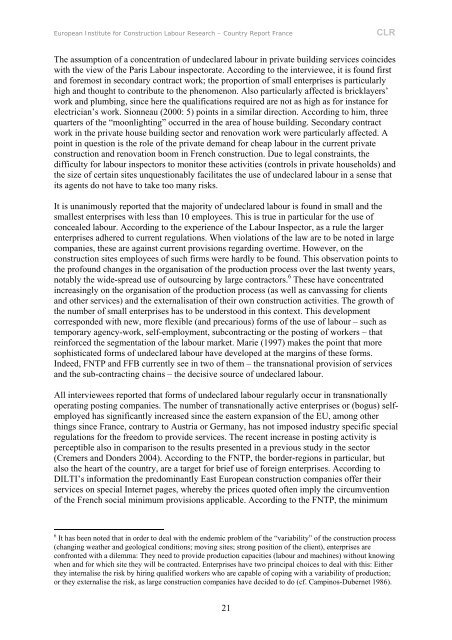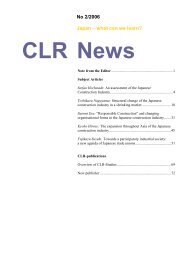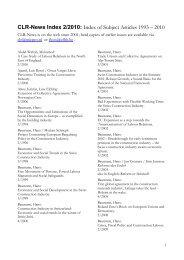Country report France - Construction Labour Research
Country report France - Construction Labour Research
Country report France - Construction Labour Research
Create successful ePaper yourself
Turn your PDF publications into a flip-book with our unique Google optimized e-Paper software.
European Institute for <strong>Construction</strong> <strong>Labour</strong> <strong>Research</strong> – <strong>Country</strong> Report <strong>France</strong>CLRThe assumption of a concentration of undeclared labour in private building services coincideswith the view of the Paris <strong>Labour</strong> inspectorate. According to the interviewee, it is found firstand foremost in secondary contract work; the proportion of small enterprises is particularlyhigh and thought to contribute to the phenomenon. Also particularly affected is bricklayers’work and plumbing, since here the qualifications required are not as high as for instance forelectrician’s work. Sionneau (2000: 5) points in a similar direction. According to him, threequarters of the “moonlighting” occurred in the area of house building. Secondary contractwork in the private house building sector and renovation work were particularly affected. Apoint in question is the role of the private demand for cheap labour in the current privateconstruction and renovation boom in French construction. Due to legal constraints, thedifficulty for labour inspectors to monitor these activities (controls in private households) andthe size of certain sites unquestionably facilitates the use of undeclared labour in a sense thatits agents do not have to take too many risks.It is unanimously <strong>report</strong>ed that the majority of undeclared labour is found in small and thesmallest enterprises with less than 10 employees. This is true in particular for the use ofconcealed labour. According to the experience of the <strong>Labour</strong> Inspector, as a rule the largerenterprises adhered to current regulations. When violations of the law are to be noted in largecompanies, these are against current provisions regarding overtime. However, on theconstruction sites employees of such firms were hardly to be found. This observation points tothe profound changes in the organisation of the production process over the last twenty years,notably the wide-spread use of outsourcing by large contractors. 6 These have concentratedincreasingly on the organisation of the production process (as well as canvassing for clientsand other services) and the externalisation of their own construction activities. The growth ofthe number of small enterprises has to be understood in this context. This developmentcorresponded with new, more flexible (and precarious) forms of the use of labour – such astemporary agency-work, self-employment, subcontracting or the posting of workers – thatreinforced the segmentation of the labour market. Marie (1997) makes the point that moresophisticated forms of undeclared labour have developed at the margins of these forms.Indeed, FNTP and FFB currently see in two of them – the transnational provision of servicesand the sub-contracting chains – the decisive source of undeclared labour.All interviewees <strong>report</strong>ed that forms of undeclared labour regularly occur in transnationallyoperating posting companies. The number of transnationally active enterprises or (bogus) selfemployedhas significantly increased since the eastern expansion of the EU, among otherthings since <strong>France</strong>, contrary to Austria or Germany, has not imposed industry specific specialregulations for the freedom to provide services. The recent increase in posting activity isperceptible also in comparison to the results presented in a previous study in the sector(Cremers and Donders 2004). According to the FNTP, the border-regions in particular, butalso the heart of the country, are a target for brief use of foreign enterprises. According toDILTI’s information the predominantly East European construction companies offer theirservices on special Internet pages, whereby the prices quoted often imply the circumventionof the French social minimum provisions applicable. According to the FNTP, the minimum6 It has been noted that in order to deal with the endemic problem of the “variability” of the construction process(changing weather and geological conditions; moving sites; strong position of the client), enterprises areconfronted with a dilemma: They need to provide production capacities (labour and machines) without knowingwhen and for which site they will be contracted. Enterprises have two principal choices to deal with this: Eitherthey internalise the risk by hiring qualified workers who are capable of coping with a variability of production;or they externalise the risk, as large construction companies have decided to do (cf. Campinos-Dubernet 1986).21









